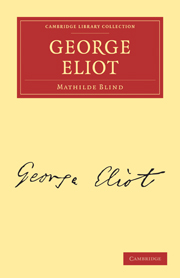Book contents
- Frontmatter
- PREFATORY NOTE
- Contents
- CHAPTER I INTRODUCTORY
- CHAPTER II CHILDHOOD AND EARLY HOME
- CHAPTER III YOUTHFUL STUDIES AND FRIENDSHIPS
- CHAPTER IV TRANSLATION OF STRAUSS AND FEUERBACH — TOUR ON THE CONTINENT
- CHAPTER V THE “WESTMINSTER REVIEW”
- CHAPTER VI GEORGE HENRY LEWES
- CHAPTER VII SCENES OF CLERICAL LIFE
- CHAPTER VIII ADAM BEDE
- CHAPTER IX THE MILL ON THE FLOSS
- CHAPTER X SILAS MARNER
- CHAPTER XI ROMOLA
- CHAPTER XII HER POEMS
- CHAPTER XIII FELIX HOLT AND MIDDLEMARCH
- CHAPTER XIV DANIEL DERONDA
- CHAPTER XV LAST YEARS
- THE PROPHECY OF SAINT ORAN: AND OTHER POEMS
CHAPTER III - YOUTHFUL STUDIES AND FRIENDSHIPS
Published online by Cambridge University Press: 07 September 2011
- Frontmatter
- PREFATORY NOTE
- Contents
- CHAPTER I INTRODUCTORY
- CHAPTER II CHILDHOOD AND EARLY HOME
- CHAPTER III YOUTHFUL STUDIES AND FRIENDSHIPS
- CHAPTER IV TRANSLATION OF STRAUSS AND FEUERBACH — TOUR ON THE CONTINENT
- CHAPTER V THE “WESTMINSTER REVIEW”
- CHAPTER VI GEORGE HENRY LEWES
- CHAPTER VII SCENES OF CLERICAL LIFE
- CHAPTER VIII ADAM BEDE
- CHAPTER IX THE MILL ON THE FLOSS
- CHAPTER X SILAS MARNER
- CHAPTER XI ROMOLA
- CHAPTER XII HER POEMS
- CHAPTER XIII FELIX HOLT AND MIDDLEMARCH
- CHAPTER XIV DANIEL DERONDA
- CHAPTER XV LAST YEARS
- THE PROPHECY OF SAINT ORAN: AND OTHER POEMS
Summary
The period from about twenty to thirty is usually the most momentous in the lives of illustrious men and women. It is true that the most abiding impressions, those which the future author will reproduce most vividly, have been absorbed by the growing brain previous to this age; but the fusion of these varied impressions of the outward world with the inner life, and the endless combinations in which imagination delights, rarely begin before. Then, as a rule, the ideas are engendered to be carried out in the maturity of life. Alfred de Vigny says truly enough:
“Qu'est-ce qu'une grande vie?
Une pensée de la jeunesse, exécutée par l'âge mur.”
Moreover, it is a revolutionary age. Inherited opinions that had been accepted, as the rotation of the seasons, with unhesitating acquiescence, become an object of speculation and passionate questioning. Nothing is taken upon trust. The intellect, stimulated by the sense of expanding and hitherto unchecked capacity, delights in exercising its strength by critically passing in review the opinions, laws, institutions commonly accepted as unalterable. And if the intellect is thus active the heart is still more so. This is emphatically the time of enthusiastic friendship and glowing love, if often also of cruel disenchantment and disillusion. In most biographies, therefore, this phase of life is no less fascinating than instructive.
- Type
- Chapter
- Information
- George Eliot , pp. 22 - 43Publisher: Cambridge University PressPrint publication year: 2010First published in: 1883

